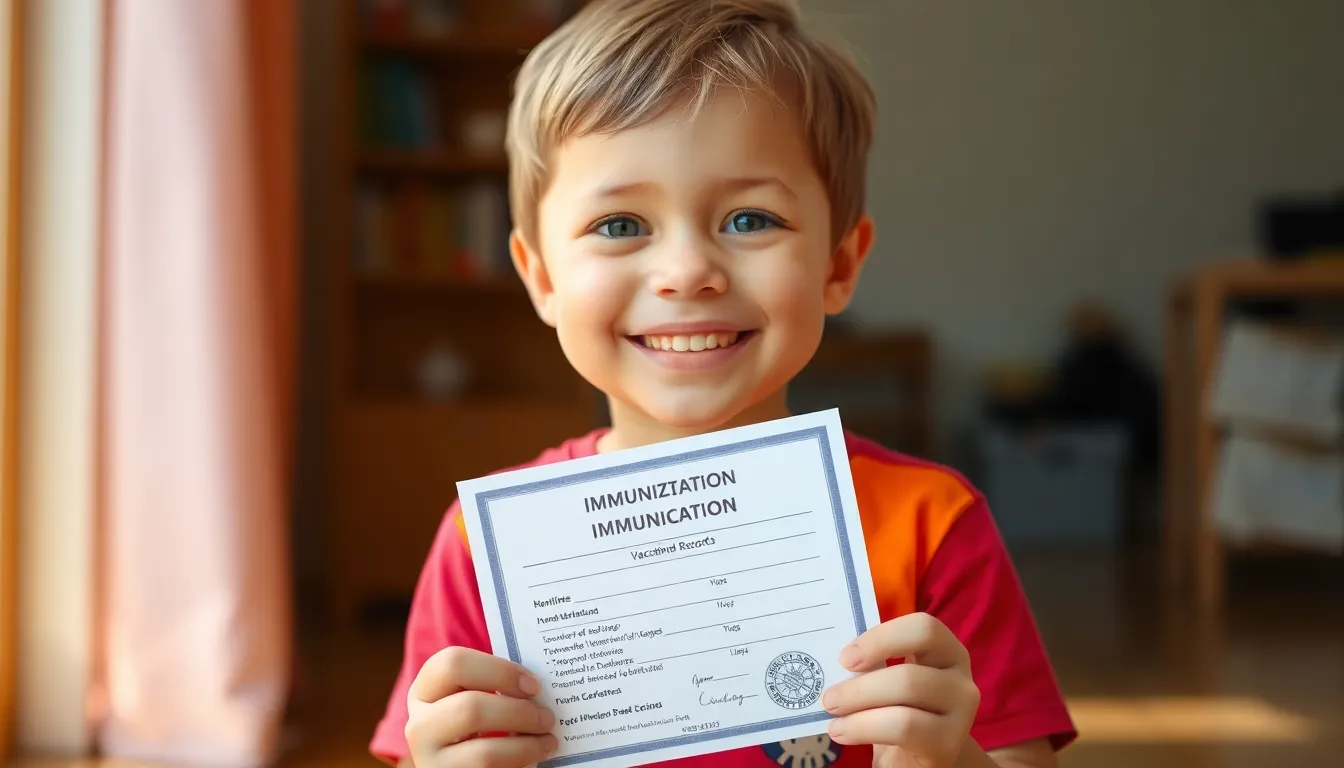Keeping track of child immunization records is crucial for parents and guardians. These documents not only provide a clear history of vaccinations but also play a vital role in ensuring children’s health and safety. With rising concerns about preventable diseases, understanding the importance of these records has never been more essential.
Navigating the world of immunizations can be overwhelming. Parents often find themselves questioning when and what vaccines their children need. By maintaining accurate immunization records, they can easily access this information, ensuring timely vaccinations and compliance with school requirements. This article explores the significance of child immunization records and offers insights into how to manage them effectively.
Table of Contents
ToggleImportance Of Child Immunization Records
Child immunization records play a crucial role in tracking vaccination history and ensuring children’s health. Maintaining accurate records supports timely vaccinations and compliance with school requirements.
Health Tracking
Health tracking becomes more efficient with a comprehensive immunization record. Parents can easily monitor a child’s vaccination status, allowing them to identify any missing immunizations. Health care providers rely on these records for informed decisions, ensuring children receive necessary vaccinations on schedule. Accurate tracking also aids in spotting patterns that may indicate potential health issues related to specific immunizations.
Preventive Measures
Preventive measures against common childhood diseases hinge on proper immunization records. An up-to-date record provides essential information for timely vaccinations, which significantly reduces the risk of outbreaks. Schools and childcare facilities often require proof of immunization for enrollment. These records ensure children meet health standards, reducing transmission risks within communities. Consequently, they contribute to herd immunity, protecting those unable to receive vaccines due to medical conditions.
Types Of Immunization Records

Child immunization records come in various forms, each serving specific purposes for tracking vaccinations. Understanding the different types helps parents and guardians maintain accurate documentation.
Official Immunization Certificates
Official immunization certificates are formal documents issued by healthcare providers or vaccination clinics. They typically include the child’s name, date of birth, vaccination dates, and vaccine types administered. These certificates often contain official stamps or signatures, validating their authenticity. Most schools, daycare centers, and sports programs require these certificates for enrollment or participation. Keeping an updated copy on hand ensures compliance with state and local immunization requirements.
Digital Immunization Records
Digital immunization records offer a modern alternative to paper documents. These records are stored electronically, often in a secure online portal accessible through healthcare providers or state health departments. Digital records allow for easy updates, provide reminders for upcoming vaccinations, and can be shared with schools and healthcare professionals seamlessly. Many parents prefer digital formats for their convenience, as they reduce the risk of losing important paper documents while ensuring quick access to vaccination history.
How To Obtain Child Immunization Records
Obtaining child immunization records is straightforward. Parents can access these records through their healthcare providers or state health databases.
Contacting Healthcare Providers
Contact healthcare providers directly to request immunization records. Parents should provide the child’s full name, date of birth, and any necessary identification, such as social security numbers. Many healthcare providers maintain electronic records, allowing for prompt retrieval. It’s advisable to inquire whether records are available as official documents or digital formats.
Accessing State Health Databases
Check state health department websites to access immunization records. Most states maintain a centralized database for immunization information. Parents can typically fill out a request form online or by mail, ensuring they include the child’s identifying details. Some states may require a government-issued ID or proof of guardianship for verification. These databases offer a reliable way to obtain up-to-date vaccination information quickly.
Keeping Records Updated
Keeping child immunization records current is vital for maintaining accurate health information. Regular updates ensure timely vaccinations and provide essential data for healthcare decisions.
Regular Check-Ups
Regular check-ups play a significant role in ensuring that immunization records remain accurate. Healthcare providers often assess a child’s vaccination status during wellness visits. Parents should schedule these appointments annually, allowing healthcare professionals to verify which vaccinations are due or overdue. These visits also provide an opportunity to discuss any new vaccines recommended by health authorities, ensuring comprehensive coverage against diseases.
Updating Information
Updating immunization records requires diligence and attention to detail. Parents should record each vaccination upon receipt, noting the date, type of vaccine, and healthcare provider information. Using a digital immunization record simplifies updates and allows secure storage. In addition, parents must access any changes in their child’s personal information, such as a change in address or name, which can impact the accuracy of health records. Submitting updated information to healthcare providers promptly ensures that records reflect the child’s current status, aiding in compliance with school enrollment and public health requirements.
Maintaining accurate child immunization records is crucial for every parent and guardian. These records not only help track vaccination history but also ensure compliance with school requirements and contribute to overall community health. By keeping these records updated and accessible, parents can better monitor their child’s health and make informed decisions regarding vaccinations.
Utilizing both official certificates and digital records offers flexibility and convenience. With regular check-ups and diligent record-keeping, parents can protect their children from preventable diseases and foster a healthier future. Prioritizing immunization records is a vital step in safeguarding children’s health and well-being.




